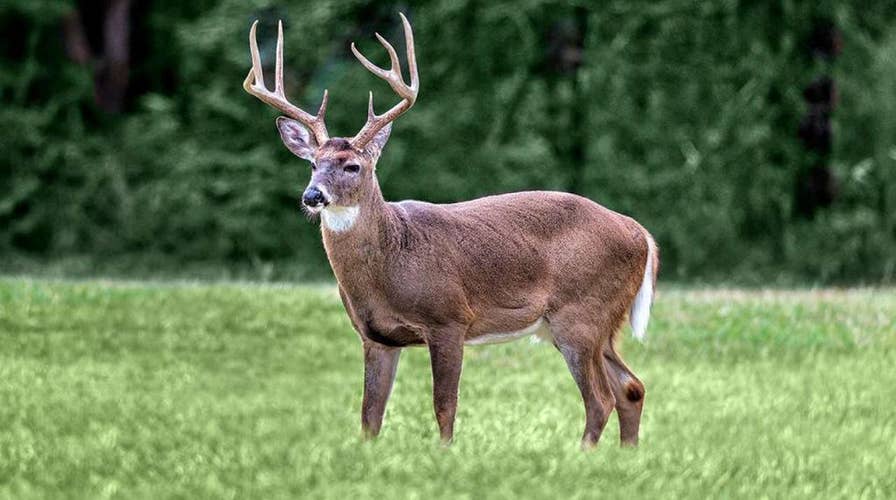Republican Rep. Ralph Abraham isn't going to wait for the deadly, so-called “zombie” deer disease to spread to his home state of Louisiana before taking action.
Abraham, who represents the state’s 5th congressional district, recently introduced a bipartisan bill that aims to stop — and hopefully find a cure — for the illness known as Chronic Wasting Disease (CWD).
DEADLY ‘ZOMBIE’ DEER DISEASE COULD POSSIBLY SPREAD TO HUMANS, EXPERTS WARN
The proposed bill, which Abraham, 64, said he expects to have “complete bipartisan support," is “important to the nation because we’re not sure how it [CWD] is transmitted,” the representative told Fox News on Friday.
Formally known as HR 837, the bill calls for both the Secretaries of the U.S. Department of the Interior and the U.S. Department of Agriculture “to partner with the National Academies of Science to study and identify the ways CWD is transmitted between wild, captive and farmed cervids (deer, caribou, elk and moose),” according to a statement from Abraham’s office. Its original co-sponsors include Rep. Glenn Thompson, R-Pa., Rep. Marc Veasey, D-Tex., and Rep. Trent Kelly, R-Miss., among others.
“These agencies have the scientists for this already, they just need the funding,” he said, explaining monetary resources for the initiative will likely come from the agencies themselves.

Rep. Ralph Abraham, R-La. (U.S. House of Representatives)
“It’s just a matter of getting the bill passed and going through appropriations,” Abraham said. He expects the bill to pass in the next 2-to-3 months “max.”
Symptoms of the fatal neurological illness — which has already affected the deer populations in two Canadian provinces and in 24 states, including nearby Mississippi — include drooling, stumbling, lack of coordination, lack of fear of people, aggression and listlessness, hence CWD’s “zombie” nickname.
Though there have been no documented cases of CWD in Louisiana, “we feel confident that it will be discovered here,” he said. “It’s just a matter of time before it gets into all 50 states.”
There are currently no vaccines or treatments for the disease and scientists aren’t exactly sure how it spreads — though some hypothesize it may be both “direct and indirect,” meaning it could be transmitted via animal to animal contact but also through feces, urine, saliva, contaminated drinking water or food, among other potential methods.
Understanding CWD is also made difficult because its infectious agents are neither bacteria nor viruses. Rather, scientists think they are prions, or “infectious proteins without associated nucleic acids,” the Centers for Disease Control and Prevention (CDC) explains.
Typically, scientists can study nucleic acids (which two types are DNA and RNA) to understand how diseases occur and how to cure them.
“We’re not sure if it can be transmitted to domestic livestock,” Abraham continued “There are a lot of unknowns.”
MINNESOTA WILDLIFE OFFICIALS SHOOT MULE DEER EXHIBITING ‘STRANGE BEHAVIOR’
There is also rising concern the disease could eventually make its way to humans.
Michael Osterholm, the director of the Center for Infectious Disease Research and Policy at the University of Minnesota, told lawmakers at the Minnesota State Capitol last week the disease should be treated as a public health issue, claiming human cases of CWD will likely be “documented in the years ahead.”
“It is probable that human cases of CWD associated with the consumption of contaminated meat will be documented in the years ahead. It is possible that the number of human cases will be substantial and will not be isolated events,” he said in part.
“If Stephen King could write an infectious disease novel, he would write about prions like this,” he added.
Osterholm likened CWD to mad cow disease, which public health officials and those in the beef industry once did not think could infect people (it has since been confirmed that a cureless variant of mad cow — Creutzfeldt-Jakob disease (vCJD) — can adversely impact humans). CWD and Creutzfeldt-Jakob disease belong to the same family of diseases known as prion diseases, according to the CDC.
"It's criticial to get this passed."
“We know what happened in England and we don’t want that here,” Abraham said, referring to the outbreak of mad cow disease in the country in the late 1980s and 1990s which led to significant economic impacts on the U.K.’s beef industry.
CLICK HERE TO GET THE FOX NEWS APP
Abraham, who worked as a veterinarian for more than a decade before entering the world of politics, said his background in the field “brings knowledge and credibility to the discussions [around CWD].”
As for the bill, Abraham said its passage is “critical.”





















